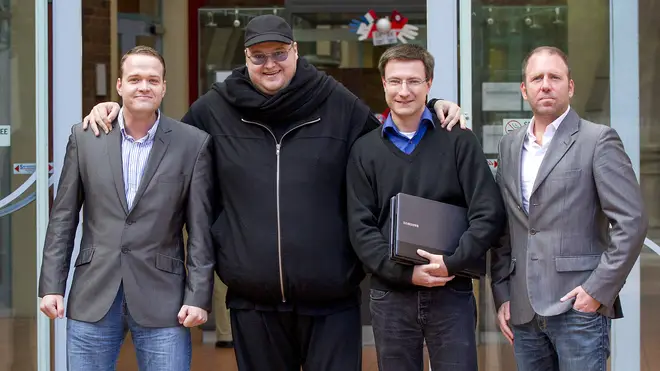
Shelagh Fogarty 1pm - 4pm
10 May 2022, 07:24

Only Megaupload’s flamboyant founder Kim Dotcom, who also lives in New Zealand, still faces the possibility of extradition to the US in the saga.
Two men charged by US prosecutors with racketeering and other crimes for their involvement in the once wildly popular file-sharing website Megaupload say they have reached a deal that will see them avoid being extradited to the States in exchange for facing charges in New Zealand.
The deal by former Megaupload officers Mathias Ortmann and Bram van der Kolk means that only the site’s flamboyant founder Kim Dotcom, who also lives in New Zealand, still faces the possibility of extradition to the US in the long-running case.
US authorities shut down Megaupload in 2012, saying it raked in at least 175 million dollars (£141.6 million), mainly from people using it to illegally download songs, television shows and movies.
The Department of Justice describes it as the largest criminal copyright case in US history.
My co-defendants in the Megaupload copyright case, Mathias and Bram, have made a deal with the US and New Zealand Government to accept liability and to become witnesses against me. They will be charged in New Zealand and will no longer face extradition to the United States.
— Kim Dotcom (@KimDotcom) May 10, 2022
Facing the possibility of spending decades in US jails if convicted, Dotcom and the other two men have fought against extradition through the New Zealand legal system for the past 10 years.
Last year, New Zealand’s Supreme Court ruled the trio could be extradited.
But it remained up to justice minister Kris Faafoi to make a final decision on extradition – and even that decision could be appealed.
In a statement issued through their lawyer Peter Spring, Ortmann and van der Kolk said the continuing uncertainty of the case had taken a heavy toll on their lives and the time had come to move on.
“Accordingly, we have reached an agreement with the New Zealand Government and the United States of America under which we have agreed to be charged in New Zealand for offences similar to those we face in the United States.”
The pair added that New Zealand was now their home “and we want to stay here”.

Lawyers for Dotcom and the other men have long argued that if anybody was guilty in the case, it was the users of the site who chose to pirate material, not the founders.
But prosecutors say the men were the architects of a vast criminal enterprise.
Dotcom and the two other men were once close friends but had a falling out after setting up a new company, Mega, following the closure of Megaupload.
In a series of tweets on Tuesday, Dotcom said his former friends would become witnesses against him as part of their deal but he did not blame them.
“I want to congratulate my former friends and partners to have found a case resolution,” Dotcom wrote.
“They can avoid the terrible US Justice system. I’m happy for them. After 10 years of US lawfare I understand why they have given up. I don’t blame them and I sincerely wish them all the best.”
Dotcom vowed to continue fighting the case.
“I won’t accept the injustice we have been subjected to,” he wrote. “If I have to go to jail for what Megaupload users did on our site then many Big Tech CEOs are in the same boat with me.”
US prosecutors had earlier dropped their extradition bid against a fourth officer of the company who was arrested in New Zealand, Finn Batato.
In 2015, Megaupload computer programmer Andrus Nomm, of Estonia, pleaded guilty in the case to conspiring to commit felony copyright infringement and was sentenced to one year and one day in US federal prison.